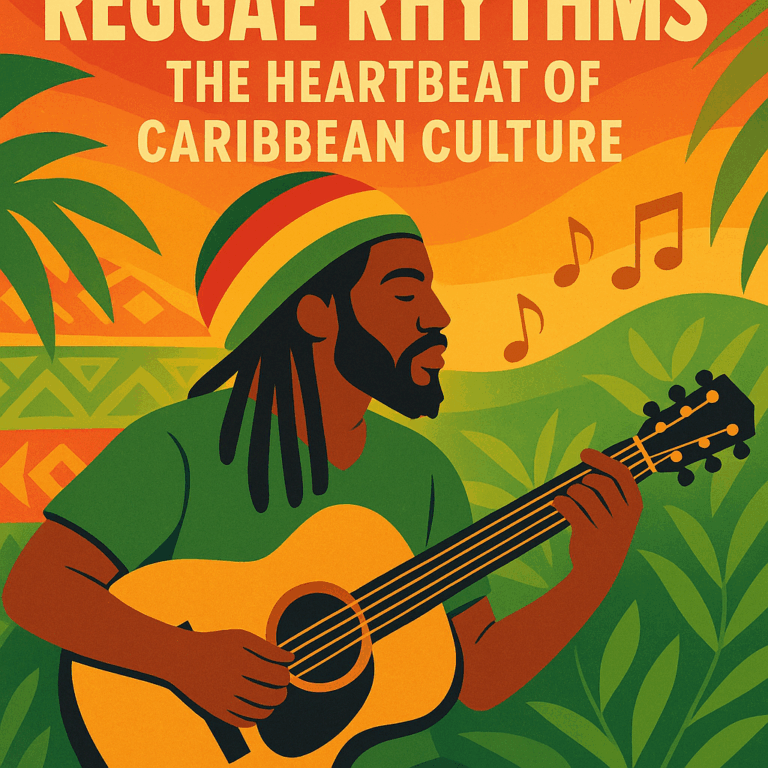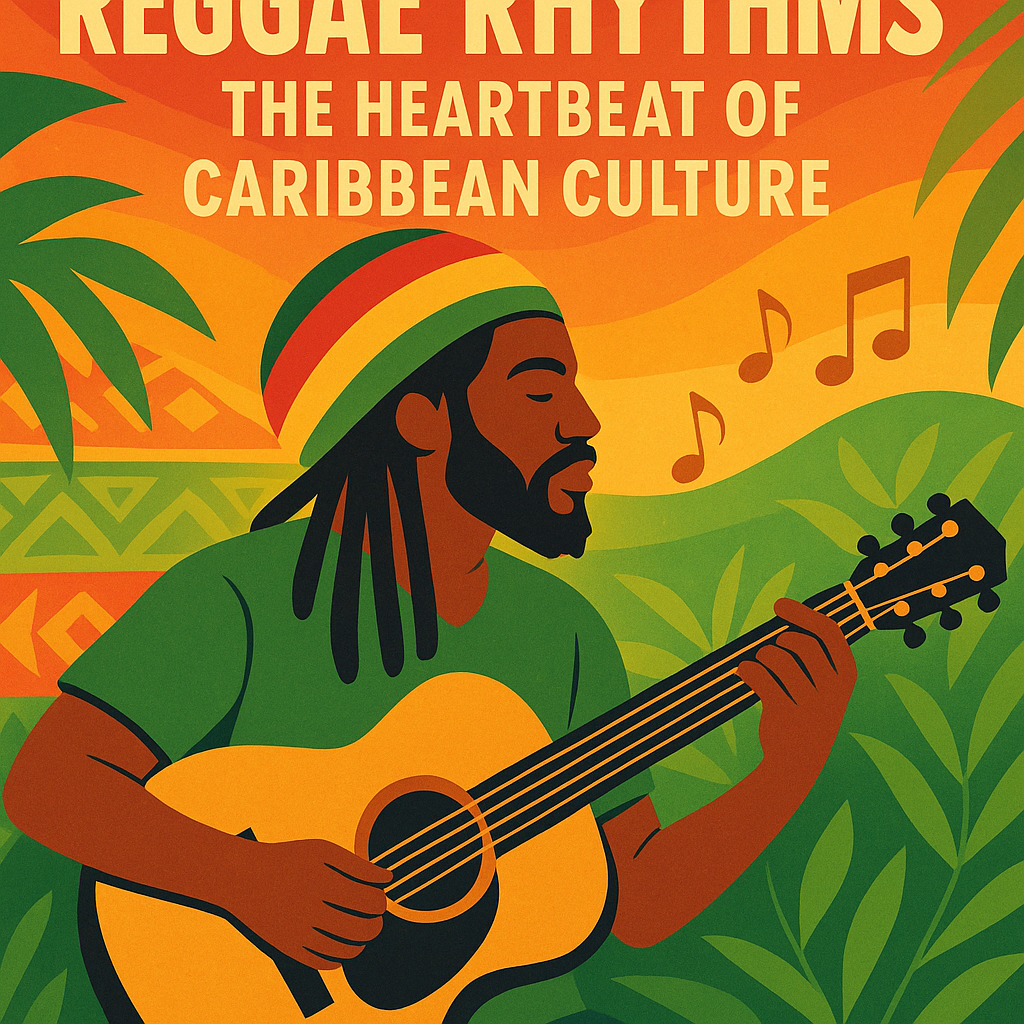The Vibrant Pulse of Reggae: A Deep Dive into Caribbean Music’s Global Ambassador

When we talk about Caribbean music, there’s a rhythm that instantly ignites the soul and transports you to sun-drenched islands with swaying palms and vibrant street festivals. That sound is reggae—a genre that not only pulses with infectious beats but carries a powerful history and cultural significance. Born in Jamaica in the late 1960s, reggae has transcended the boundaries of a small island to become a global phenomenon, a voice for social change, and a unifying force within Caribbean communities and beyond.
Origins and Cultural Roots of Reggae
To truly appreciate reggae, we must journey back to Jamaica in the 1960s, a time of immense transformation as the island shifted from colonialism to independence. Reggae emerged out of a rich tapestry of musical influences—Mento (a traditional Jamaican folk style), American jazz and rhythm and blues, and ska, which itself was a precursor to reggae. This blend created a distinctive sound that resonated deeply with Jamaican youth.
Reggae’s slower tempo compared to ska and rocksteady gave space for lyricism and storytelling focused on social issues, spirituality, and resistance. At its heart, reggae is the voice of the oppressed and a beacon for hope and empowerment. Rastafarianism, a religious and cultural movement originating in Jamaica, heavily influenced reggae’s themes of unity, peace, and connection to African roots. The music became a vehicle for these messages, weaving spirituality and protest into a rhythmic tapestry that spoke truth to power.
The Sound and Performance of Reggae
Reggae’s sound is distinct and unmistakable. It’s built around the “one drop” rhythm where the snare drum hits the third beat of the bar, creating a laid-back groove that invites your body to move effortlessly. The bass guitar holds center stage, providing deep, melodic lines that often carry the song’s core message. Guitar and keyboards punctuate with offbeat “skank” chords that add a percussive zing, while horns sometimes blaze in to accentuate climaxes.
Vocals in reggae can range from smooth and soulful to raw and urgent, often featuring call-and-response elements or harmonized backing vocals. Lyrics address everything from love and social justice to poverty, war, and Rastafarian spirituality. The performance of reggae is a communal experience, deeply interactive, often accompanied by dancers expressing the music’s groove and message.
You’ll find reggae performed everywhere—from informal street corners and beachfront bars to massive festivals like Reggae Sumfest in Jamaica or Rototom Sunsplash in Europe. It thrives in intimate live settings where the message and rhythm move beyond the speakers to touch hearts directly.
Caribbean Communities and the Global Reach
For Caribbean communities, reggae is more than music—it’s a cultural emblem, a source of pride, and a critical storytelling medium. It reflects historical struggles, contemporary realities, and aspirations for peace and justice. Through reggae, Caribbean people celebrate their identity and share their rich culture with the world.
Beyond the islands, reggae’s influence has spilled into varied genres such as hip-hop, punk, and pop, inspiring generations of musicians globally. It became a unifier, promoting multicultural solidarity and awareness. “One good thing about music, when it hits you, you feel no pain,” Bob Marley famously said—a testament to reggae’s healing essence.
Icons of Reggae: The Legends and Luminaries
Three artists stand tall as pioneering pillars in reggae’s story, each leaving an indelible mark:
1. **Bob Marley**
Undoubtedly the most iconic figure in reggae history, Bob Marley brought Caribbean music to the global stage like no other. His blend of soulful melodies and revolutionary lyrics transcended borders, making reggae synonymous with messages of love, unity, and resistance. Hits like “No Woman, No Cry,” “Redemption Song,” and “One Love” are anthems of hope and truth.
2. **Peter Tosh**
A founding member of The Wailers alongside Marley, Peter Tosh was a fierce advocate for social justice and equal rights. His music delivered potent messages with uncompromising clarity and empowered marginalized voices. Songs like “Legalize It” and “Get Up, Stand Up” remain rallying cries for justice and freedom.
3. **Burning Spear**
Known for his deep-rooted Rastafarian themes and hypnotic rhythms, Burning Spear (Winston Rodney) is venerated for preserving reggae’s spiritual core. His work connects Afrocentric themes with pride and cultural affirmation, offering a sonic journey into Jamaica’s history and consciousness.
Where to Experience Reggae
Want to catch the authentic vibe of reggae? The Caribbean is of course the heartland. Jamaica’s Kingston, the birthplace of reggae, pulses with music festivals, street performances, and record studios that have shaped the genre’s evolution. Reggae Sumfest, held every summer, is the ultimate showcase of reggae’s raw energy and superstar talent.
Outside the Caribbean, reggae festivals like Rototom Sunsplash in Spain or Rebel Salute in Jamaica attract international crowds eager to immerse themselves in reggae culture. Additionally, reggae’s influence permeates local scenes worldwide—from the UK’s vibrant sound system culture to urban centers in the United States with strong Caribbean diasporas.
Why Caribbean Music—and Reggae Especially—Still Matters
Reggae is a shining example of Caribbean music’s power to transcend entertainment and become a powerful cultural force. It encapsulates the rhythm of island life while speaking universal truths about human dignity, freedom, and resilience. Whether you’re a longtime fan or new to the genre, reggae invites you to not only move to the beat but also reflect and unite.
So next time you hear that unmistakable bassline and those skanking guitar chops, let the music pull you into the island groove. Feel the stories, feel the spirit—because reggae is not just a sound, it’s a soulful Caribbean heartbeat that continues to resonate worldwide.




